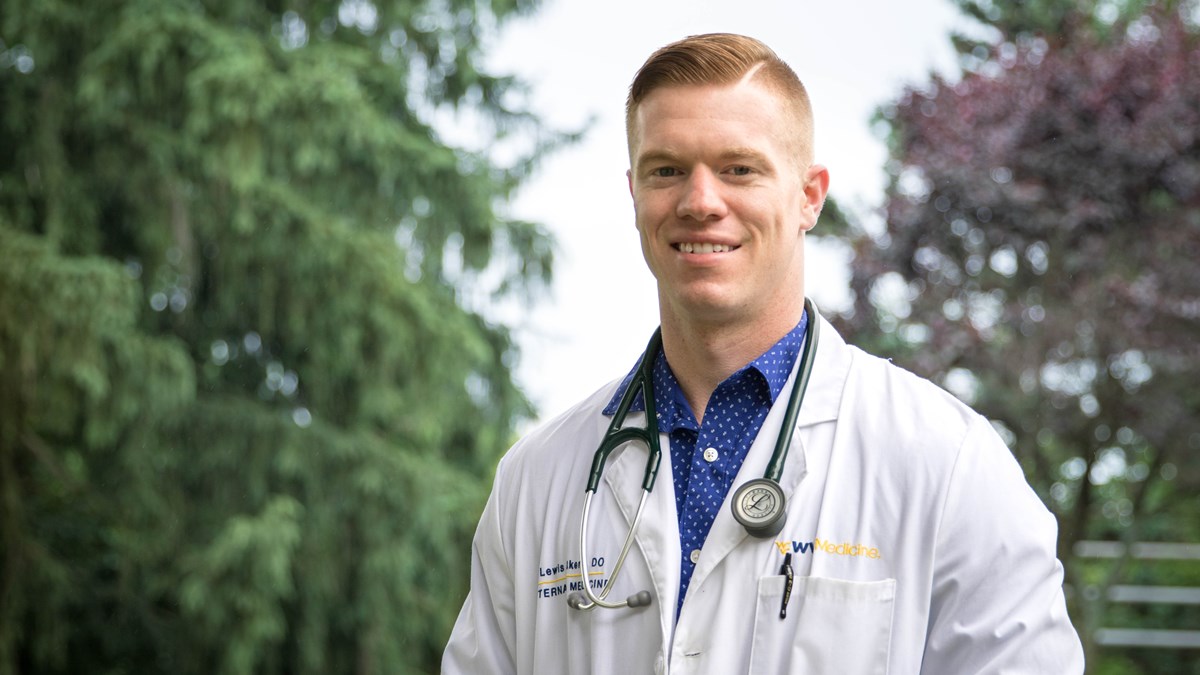Lewis Akers

“I believe that when you are bettering yourself, you provide your patients with the best care.”
A battle against heroin addiction, a trip to the hospital, a plan for care, and then a dismissal. A scene too common in Appalachia.
Medical resident Lewis Akers is seeking to bring light to a situation that has affected not only his career, but his family. Placed in a unique position Akers’ experiences have put patient care at the core of his residency.
Two years ago, Akers’ career and life changed. His younger brother was hospitalized for a life-threatening drug addiction and later discharged himself against medical advice.
“My brother left the hospital after experiencing feelings of hostility from the care team,” Akers said. “I began to wonder if his outcome would have been different if his care had been different.”
Every day, clinicians are handling the practical challenges of addiction, especially when it comes to treating opiate-dependent patients in West Virginia.
This year, Akers’ brother was admitted into the hospital for the second time seeking medical attention for an addiction controlling his life.
“I worried he would make the choice to discharge himself again,” Akers said. But this time the approach to care was different, and therefore so was the outcome.
The doctor sat at his brother’s bedside and asked a few questions: “Why are you using? Why do you want to live?” The doctor treated his patient like a person, without passing judgment. It was this humanitarian approach that encouraged his brother to enroll in a rehab facility. His brother has now been clean for several months -- the longest span in five years.
Through this season of life Akers has been able to realize his own prejudice in the workplace when treating patients with an opioid addiction.
“I am not in a position of education or opportunity where I should be above or looking down at others. I should be utilizing my position to advocate for the cause,” Akers said. “This situation allowed me to step back from how forward and aggressive I could be with patients and truly listen.”
“I encourage health care professionals to remember that we are all human, and it is an easy habit to get into the mindset of diagnosis and problem assessment. But, truly listening could change the next path your patient takes in their life,” he said.
According to Akers, it can be frustrating when a healthcare professional wants to help a patient who isn’t helping themselves, but keeping the end-goal in sight is crucial.
With a background in philosophy, Akers finds that journaling is the best way for him to reflect on his daily experiences with patients. Reflection is what has influenced Akers to alter his approach during patient care.
“During my time journaling I realized that what I was writing was coming from a place of frustration,” Akers said. “I was allowing my own emotional psyche to influence my care.”
Akers soon felt inclined to share his unique story with his peers through an open letter. He encouraged healthcare professionals to reflect on their daily encounters with patients and how they chose to respond in difficult scenarios.
“My brother’s experience has impacted how I choose to look at situations. I think about what I would do if this were my family,” he said.
In his letter, Akers asks his peers to take time to reflect on times they have spent with substance use patients in the past year. He asks questions such as, “Did you feel as though you were not being respected? Did that patient cause you to feel emotions of annoyance, anger or stress?” The purpose behind these questions was to reveal and understand possible prejudices within oneself.
In 2017, 909 people in West Virginia had died of drug overdoses an increase from the previous record of 887, set in 2016 according to data released by the state Health Statistics Center.
“It is exhausting. It is tough. It is emotionally draining. It is medicine - it is the career we have chosen,” he said in his letter.
Akers encourages health care professionals to find the best form of reflection for themselves. For him it is journaling, but for others, it may be something else.
“I believe that when you are bettering yourself, you provide your patients with the best care,” Akers said.